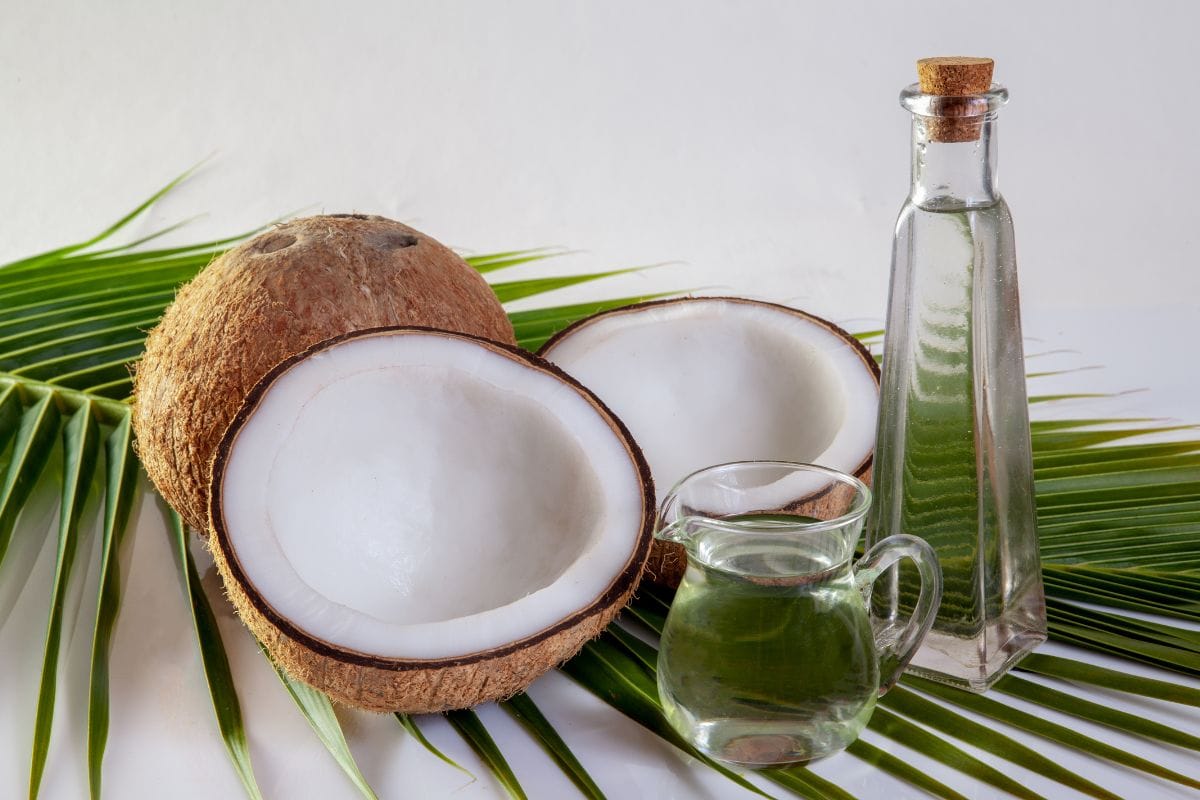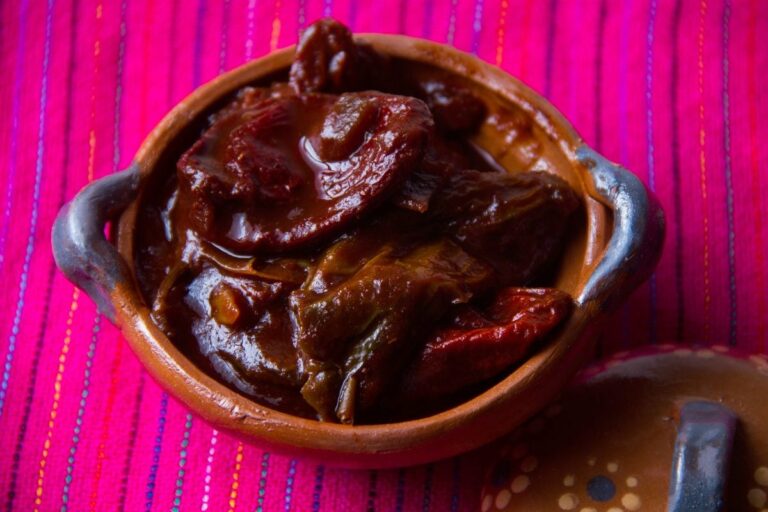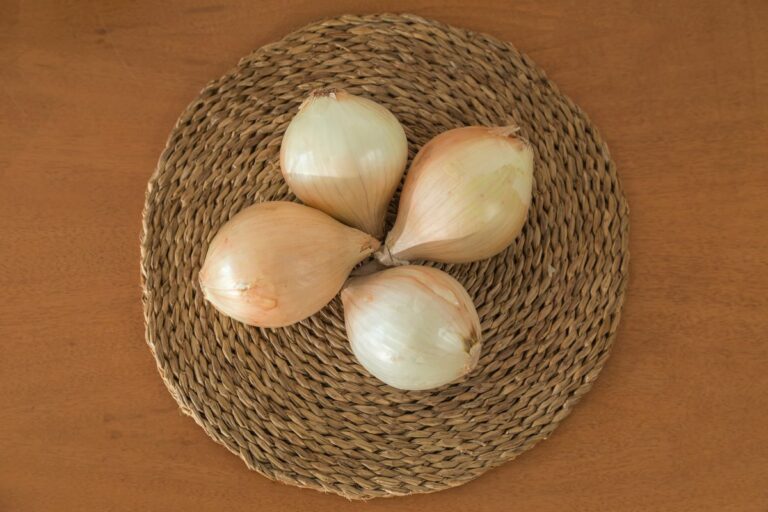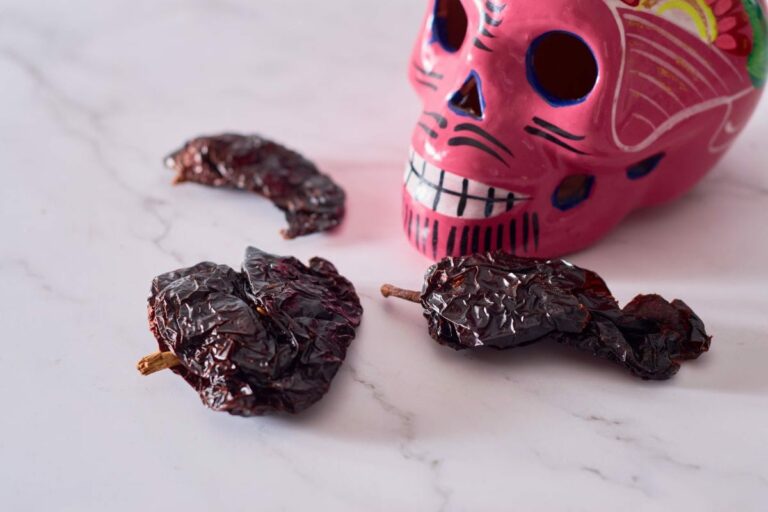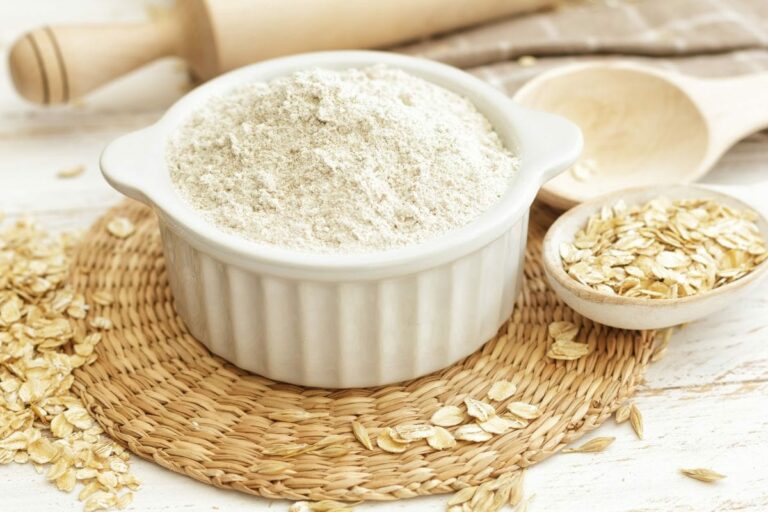The Vinegar Swap: Incorporating the Most Delicious Alternatives to Coconut Vinegar
Coconut vinegar is a popular ingredient in many Asian dishes. It has a unique, earthy taste that is aesthetically elegant as a whole. If you can’t find it in your local grocery store, don’t worry! Several substitutes will give your dish a similar flavor profile.
What are the best substitutes for coconut vinegar substitutes? There are several substitutes that you can use but your first preference should be to try making homemade coconut vinegar. Apple cider vinegar, white rice vinegar, malt vinegar, and lime juice are all good substitutes. Balsamic vinegar will be the best gluten-free option. You can also use champagne vinegar, or fruit-infused vinegar if you want a special fruity flavor.
These substitutes will work just as well in your recipes. In this article, we’ll share the best substitutes for coconut vinegar. We’ll also shed some light on coconut vinegar, its uses, and its health benefits as well.
Coconut Vinegar
Coconut vinegar is a popular ingredient in Southeast Asian cuisine, but it can be hard to track down. Coconut vinegar (or coconut palm vinegar) is a type of vinegar made from the sap of coconut palm trees. The sap is fermented and then distilled, producing a clear, amber-colored vinegar with a slightly sweet and sour taste. It is also popular for its medicinal properties and can be used to treat a variety of diseases in humans.
According to Food and Drug Administration (FDA), coconut vinegar must have 4% acetic acid. If it is less than 4 then it shouldn’t be labeled as coconut vinegar. Make sure to buy an FDA-approved coconut vinegar at Natural Grocery Stores or Food Markets to get the maximum benefit.
Uses of coconut vinegar
Coconut vinegar is a versatile product that can be used in various ways. Here are a few of its most common uses:
- To flavor curries (meat or vegetable)
- Put it in Chinese rice
- Use it on meat before cooking
- Use it to make baked food
- To make homemade ketchup
- To flavor stir-fries like Tofu stir-fry
- Cook it in pasta
- Mixing into salad dressings
- Adding it to marinades
- Can be used to detox drinks and tonics
- Can be used to make vegan blackberry muffins
- Use it in making sauces like homemade tartar sauce or BBQ sauce
8 best substitutes for Coconut Vinegar
| Sr. No. | Coconut Vinegar substitutes | Best used for |
| 1 | Homemade Coconut Vinegar | Marinades, dips, dressings |
| 2 | Apple Cider Vinegar | Sauces, salad dressings, marinades |
| 3 | White Rice Vinegar | Sushi, salad dressings, sauces, marinades |
| 4 | Malt Vinegar | Chutneys, salad dressings, marinades |
| 5 | Lime Juice | Cake, salsa, marinade, salad dressings |
| 6 | Balsamic Vinegar | Tomato basil salad, crostini appetizer, salad dressings |
| 7 | Champagne vinegar | Marinade, fruit salad, fruit salsa, hollandaise sauce, homemade mayonnaise |
| 8 | Fruit-infused Vinegar | Health drinks, Cocktails, marinades, pickles, salad dressings |
1. Homemade Coconut Vinegar
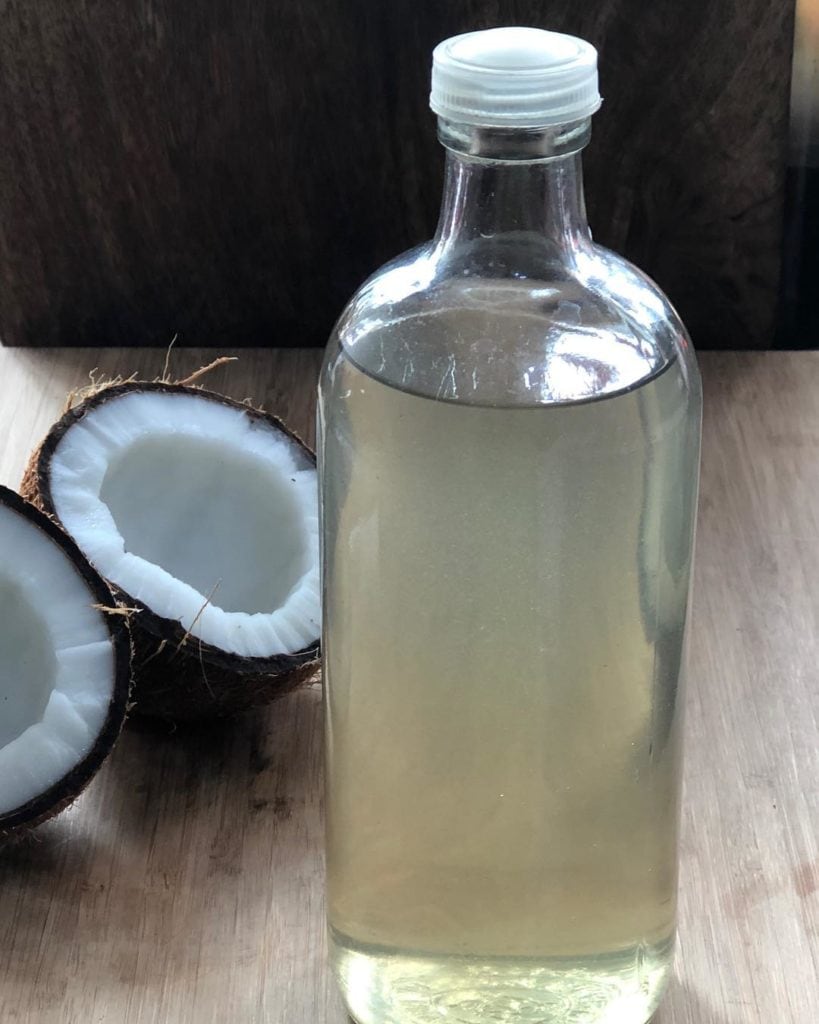
Homemade coconut vinegar is composed of the same beneficial compounds, including acetic acid, propionic acid, enzymes, potassium, zinc, and magnesium. It also has a milder flavor and thinner texture than other types of vinegar, making it a great choice for dressings, marinades, and dips.
Due to its growing popularity, coconut vinegar can now be found in most major grocery stores. However, if you can’t find it locally, you can easily make your own using distilled white vinegar and fresh coconut. It will take more or less than 7 days to prepare this vinegar at home.
Ingredients
- Unsweetened shredded coconut – 1 cup
- Distilled white vinegar – 1 ½ cup
Procedure
Infuse the shredded coconut in white vinegar and put the pan on the stove. Under medium heat, make it to steam but not boil for 20 mins. Allow it to cool for1 an hour at room temperature before transferring it to a mason jar. Store it in your pantry for 2-7 days.
Strain it to remove the coconut from the vinegar and store it separately. This coconut-infused vinegar can be kept in the refrigerator for up to 6 months. Use the same quantity of homemade coconut vinegar as that of commercial-bought coconut vinegar in any cooking recipe.
2. Apple Cider Vinegar
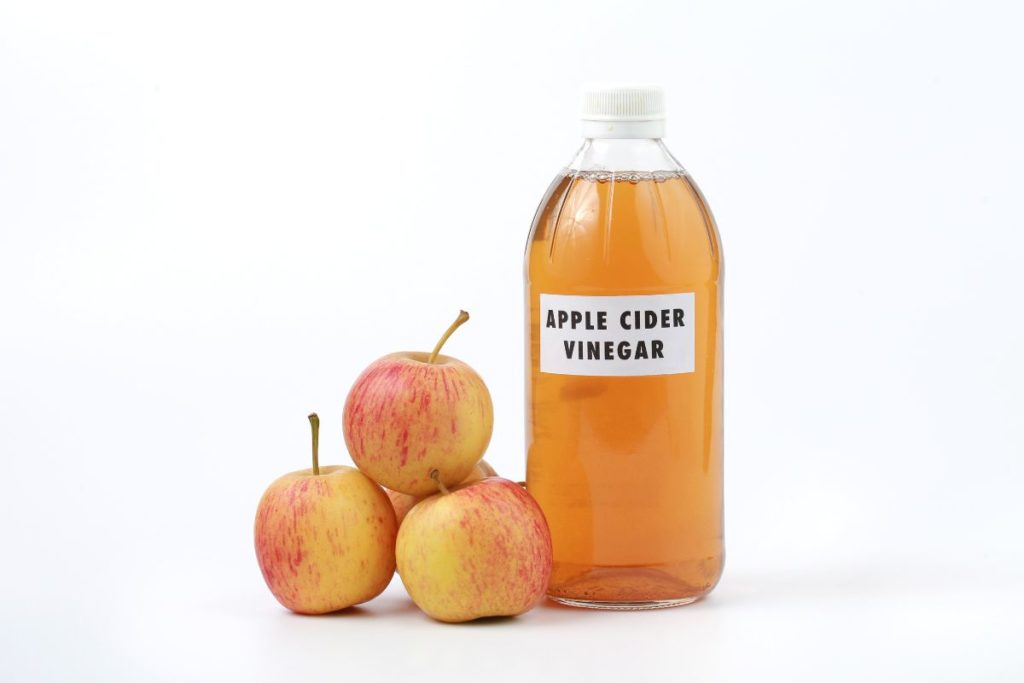
Apple cider vinegar is a type of vinegar made from apple cider. It has a light amber color and a mild, fruity flavor. Unlike coconut vinegar, apple cider vinegar is made from fermenting apples, so it contains malic acid, which gives it a sour taste.
Apple cider vinegar is a popular ingredient in salad dressings, marinades, and sauces. It’s also said to have several health benefits, including reducing inflammation, aiding in weight loss, and detoxifying the body. Apple cider vinegar is not gluten-free.
They both contain acetic acid but their origin is different. Apple cider vinegar tends to be more acidic than coconut vinegar. While apple cider vinegar doesn’t have the same tropical flavor as coconut vinegar, still it’s a good substitute if you can’t find coconut vinegar.
3. White Rice Vinegar
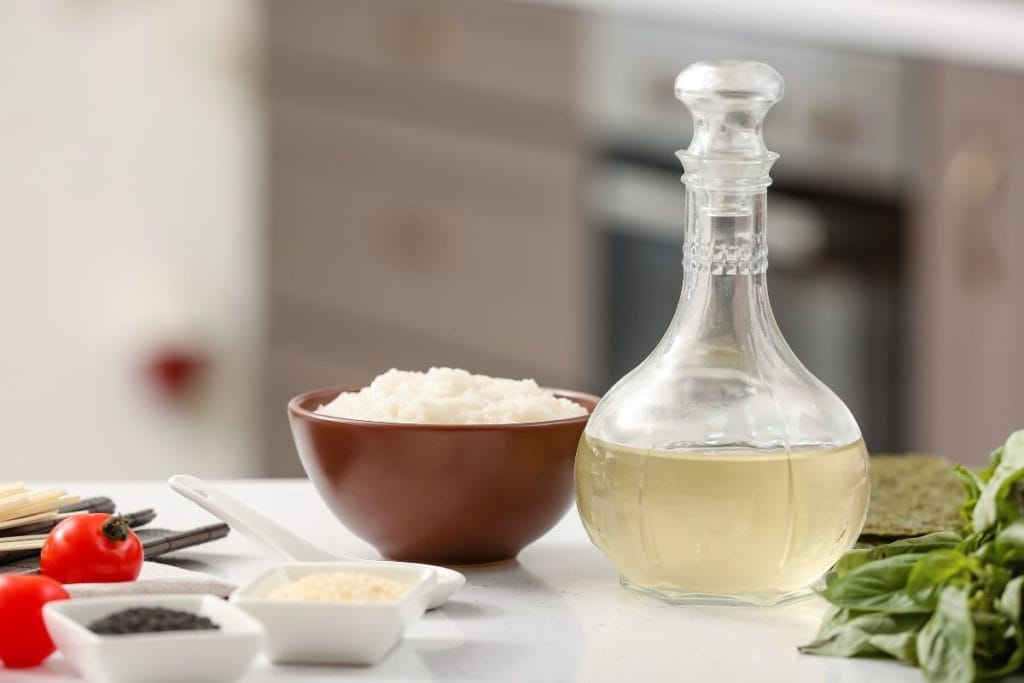
White rice vinegar is made from fermented glutinous rice. The rice is polished to remove the bran and then soaked in water. Yeast and a mold called Aspergillus oryzae are added to the mixture, and the rice is left to ferment for a while. The end result is vinegar that has a mild, sweet flavor and a light yellow color.
Similar to coconut vinegar, white rice vinegar is a good source of enzymes and minerals like potassium, magnesium, and phosphorous. It also contains acetic acid which helps to kill bacteria, making it a good choice for cleaning purposes.
4. Malt Vinegar

Malt vinegar is a type of vinegar that is made from malted barley or other grains. It has a sour taste and is often used in salad dressings, marinades, and chutneys. Unlike coconut vinegar, malt vinegar is made from grain, so it contains gluten. It is also not as acidic as coconut vinegar and has a slightly sweet flavor.
One similarity between malt vinegar and coconut vinegar is that they are both made from natural ingredients. However, malt vinegar contains gluten, which coconut vinegar does not, and malt vinegar is less acidic than coconut vinegar.
5. Lime Juice
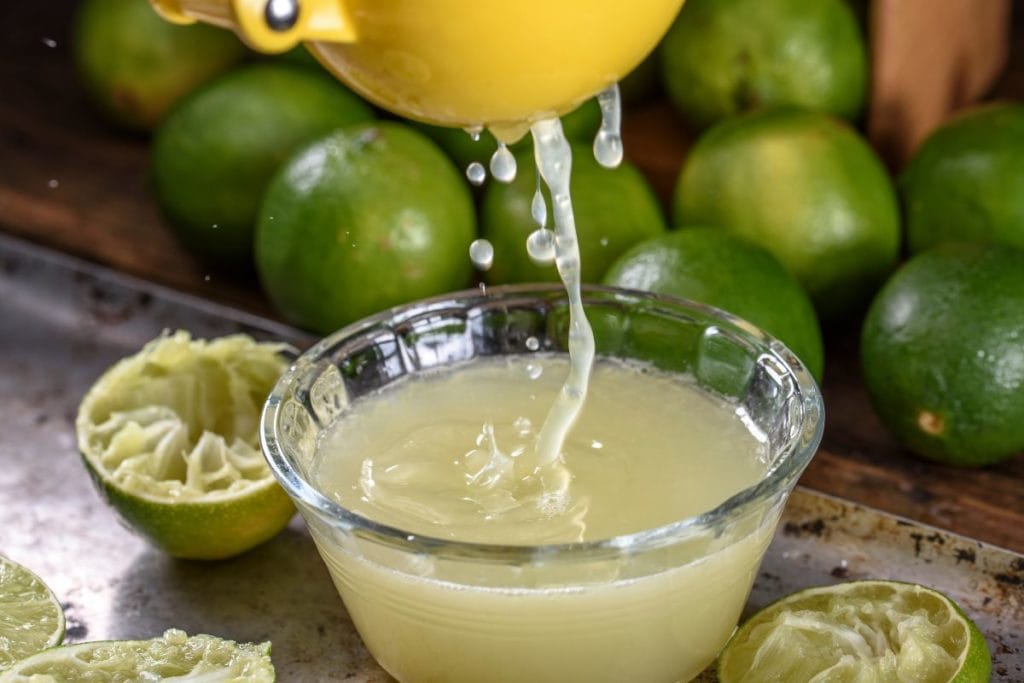
Coconut vinegar has a light, sweet and tangy taste. Lime juice is a great substitute for coconut vinegar as it has a sour, acidic taste that mimics the tanginess of coconut vinegar. It is a good source of vitamin C too. It’s also high in citric acid, which makes it a great natural preservative.
6. Balsamic Vinegar

Coconut vinegar is a popular choice for those following a ketogenic diet or who are gluten-free. However, it can be difficult to find in some areas. If you’re unable to find coconut vinegar nearby, you may want to try one of these substitutes:
Balsamic vinegar is made from grapes and has a sweet and tangy flavor. Its composition is similar to coconut vinegar, as it contains acetic acid, water, and sulfates. Balsamic vinegar is also gluten-free. Another gluten-free option is white wine vinegar which is made from the white wine and has a fruity flavor. It contains acetic acid, water, and sulfates.
7. Champagne Vinegar
As you can see, there are a few different substitutes for coconut vinegar that will work in most recipes. However, if you want something special, try champagne vinegar.
Champagne vinegar is a great option if you’re looking for an all-purpose substitute. It has a light fruity flavor and a slightly acidic taste that pairs well with both sweet and savory dishes. It’s also made with all-natural ingredients, so it’s a good choice if you’re looking for a healthy alternative.
8. Fruit-infused Vinegar

Whether you’re looking for an adequate substitute for coconut vinegar or are just curious about fruit-infused vinegar in general, this section is for you. Fruit vinegar is made by infusing fruits or fruit juices with vinegar. This can be done with either white or apple cider vinegar. The result is a fruity, lightly sweetened vinegar that can be used in many of the same ways as coconut vinegar.
The origins of fruit-infused vinegar are unknown, but they’ve been around for centuries. In fact, many commercial brands are now available. The most popular flavor is raspberry, but there are also versions made with strawberry, blackberry, blueberry, and more.
Health benefits of Coconut Vinegar
Coconut vinegar, as mentioned earlier, came from the sap of coconut flowers which is a good source of dietary fiber, minerals, and vitamins. The most important nutrients and minerals present in coconut vinegar are polyphenols, probiotics, potassium, magnesium, phosphorous, zinc, copper, and manganese. It also contains 17 amino acids which makes it a good source of protein.
The health benefits of consuming coconut vinegar are many. It helps in weight loss and digestion, regulates blood sugar levels, and has anti-inflammatory properties. For drinking purposes, you need to dilute it before use as it can damage your teeth and gut if taken intact. Put one tbsp of coconut vinegar in 8 ounces of water to make it fit for drinking.
Conclusion
Coconut vinegar is a great product to have in your pantry for its many health benefits and delicious flavor, but what do you do if you can’t find it near you? These substitutes work just as well in recipes calling for coconut vinegar.
White Rice vinegar is a popular choice, as is apple cider vinegar. You could also use champagne vinegar or malt vinegar, depending on the recipe.
So don’t let the absence of coconut vinegar keep you from trying out all the great recipes that call for it – these substitutes will work just fine.
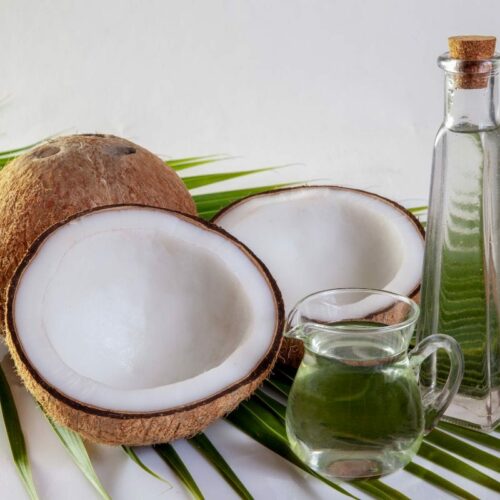
8 Best Substitutes for Coconut Vinegar
Ingredients
- Homemade Coconut Vinegar
- Apple Cider Vinegar
- White Rice Vinegar
- Malt Vinegar
- Lime Juice
- Balsamic Vinegar
- Champagne vinegar
- Fruit-infused Vinegar
Instructions
- From the list of substitutes above, pick your favorite to use in its place.
- Use your imagination and be creative with these substitute recipes!

